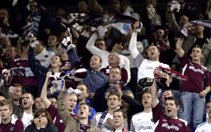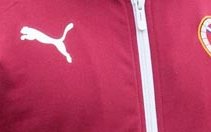When I look back on Sandy Clark’s time as Hearts manager it’s always with a twinge of sadness.
Sandy was hugely popular as a player for the club during their resurgence in the mid-’80s, with his physical, old-fashioned centre-forward approach to the game proving to be the perfect foil for John Robertson in the Hearts attack.
After a few years away from Tynecastle, during which he wound up his playing days in the lower leagues and got himself into coaching, he came back to Tynecastle as Youth Team Coach and did a fine job in moulding the terrific young side that lifted the BP Youth Cup in the early ’90s. Clark’s team gave us our first look at the likes of Kevin Thomas (who was a standout back then), Allan Johnston, Gary Locke and Paul Ritchie among others, and his reputation as a promising young coach was very quickly developing.
However I don’t expect that even Clark himself expected to be given as big a job as that of Hearts manager so soon after his fine work with the youngsters. He was initially given ‘caretaker’ control of the side in the wake of Joe Jordan’s departure towards the end of the ’92/’93 season, and although the results he achieved then didn’t exactly set the heather on fire, the fact that he appeared to get Hearts back to playing something resembling football again was enough to have people talking in terms of him getting the job on a more permanent basis. The fact that he was prepared to blood some of his youngsters, who all had a huge amount of respect for Clark, was also a big plus in his favour.
Chairman Wallace Mercer clearly agreed with those sentiments and Clark was duly installed as Hearts’ new manager in the closed season of 1993. At this time the job of Hearts manager was always going to be a very difficult one, as the club were going through a transitional phase. A lot of deadwood from the Jordan era had to be cleared out, and due to the lack of serious money for Clark to re-invest in the squad, he had to do his best with what little he had to go about re-shaping his side.
Initially the signs were positive for Clark. He had re-signed the ever-popular John Colquhoun, and although the signing of Justin Fashanu from Airdrie was controversial, it was hoped that both could add some much-needed guile and experience to the striking department. Clark also brought in some of his youth team players, with the likes of Locke, Johnston and Thomas all being given first-team starts in the early part of the season. All of this was received well by a Hearts support who were sympathetic to the new man’s position.
However despite the initial promise, Hearts’ season quickly went sour and a shocking run of results had them battling it out at the wrong end of the table. Clark had also gone back into the transfer market shortly into the season after Mercer afforded him the luxury of £300,000 to spend, but this went pear-shaped when he used it on Hamilton Accies defender Jim Weir. This turned out to be his most expensive mistake – Weir looked completely out of his depth at SPL level and after a series of poor performances, had little or no confidence, which was a situation that he was never to fully recover from at Tynecastle.
With the year drawing to a close and Hearts looking more and more like genuine candidates for the drop with each passing week, Clark and Mercer pulled off a surprising coup when they swooped to sign former Celtic and Rangers striker Maurice Johnston from Everton. Johnston had been out of favour down south, but at the age was 30 still had plenty to offer, and his signing at the time helped to give the club a badly needed lift, not to mention some slightly better coverage in the press!
Gradually Hearts started to steady the ship. Johnston quickly showed that he still possessed many of the qualities that had once made him the country’s most talented all-round striker, and this combined with his tireless energy and enthusiasm helped to lift the confidence of some of the other players. One match in particular at home against champions Rangers on a wet Wednesday night summed up the improved spirit of the side – two goals down at half-time and looking at a hammering, Hearts battled back to snatch a dramatic 2-2 draw, with John Colquhoun burying a memorable diving header in the closing minutes from a driven Robbo cross at the School End.
However despite some improvement, Hearts were still at the wrong end of the table and firmly involved in a relegation dogfight. Performances weren’t bad but Hearts weren’t winning enough games – they’d taken a few high profile points, most notably another 2-2 draw with Rangers, this time at Ibrox, and also against Hibs in the New Year derby after being goals down in both matches, but wins were what they required to start breathing more easily.
Clark was getting stick from some quarters, but he pulled off a masterstroke early in the new year with the signing of full-back Stevie Frail from Dundee. Frail had been a highly-rated young player for quite a few years but had had tough luck with injuries. The move came as a surprise, but it turned out to be a very pleasant one when the Hearts support witnessed just how good a player that Shaggy was – a right-back who had a good reading of the game, decent pace, linked well with his midfield and attack and had a great cross on him. In other words, everything that Hearts hadn’t had in this position since…….well, since before my time to be honest!
With Frail on board and the team continuing to battle away, Hearts were still perilously close to the drop zone, and although they were rarely losing matches, they still weren’t winning enough to have pulled clear. It ended up coming down to the last three matches of the season, and I don’t think I can remember a nervier time as a Jambo, particularly the 1-1 draw secured against Aberdeen at half-bulldozed Tynecastle (the Wheatfield Stand was being built the following summer), courtesy of a late John Robertson penalty. Standing there flinching every time someone with a radio informed everyone that a goal had gone in elsewhere was not an experience that many of us particularly enjoyed!
Eventually Hearts put their safety beyond doubt on the season’s last day when, needing only a draw at Firhill, they beat Partick Thistle 1-0 thanks to a late Alan McLaren header. Relief was considerable all round, but there was also some genuine optimism about the season ahead, as despite Sandy Clark’s first season being such a struggle, he had really managed to get his team playing for him since the turn of the year, and if they could get off to a more solid start in the following term, they definitely now had the players to play some decent stuff and perhaps finish in a respectable league position. Both Mo Johnston and Stevie Frail had already become two of the more key players in the side, John Colquhoun had done well on his Tynecastle return and now that Craig Levein was fit again, the defence had a much more settled look to it.
Sadly though, despite Hearts having only lost something like four matches out of their last 20 or so, new owners Chris Robinson and Leslie Deans, in their ‘wisdom’, decided to make the sacking of Sandy Clark their first major decision. Many felt that this was harsh considering Clark’s efforts to galvanise the team in what had been (and what was always going to be) such a difficult season of transition, but the new men clearly wanted to start afresh.
The man that they chose to succeed Clark, Tommy McLean, is one that we’ll examine in our next look back at Hearts managers of yesteryear…….
Share this article




Well researched, Mr H. I do recall the feeling of a more adventurous approach to games under Clark, compared to Mr Jordan. The fact that Clark accepted a coaching job at Aberdeen shows that perhaps he felt he couldn’t face another manager’s job after being fired from Partick, Dunfermline, Hearts and St Johnstone in the space of 10 years
Possibly…maybe his main problem was always coming across as a bit of a nice guy…bit like Jim Duffy? Both great football men but just seemed to come up a tad short when it came to management, although like I said in the article, I thought Clark merited more of a chance at Hearts. Had he got it then he may well have gone onto become a really decent manager.